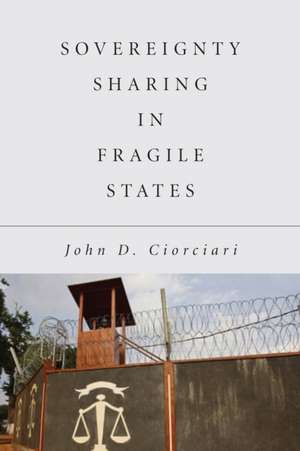Sovereignty Sharing in Fragile States
Autor John D. Ciorciarien Limba Engleză Hardback – 15 mar 2021
In Sovereignty Sharing in Fragile States, John D. Ciorciari sheds light on how and why these extraordinary joint ventures are created, designed, and implemented. Based on extensive field research in several countries and more than 150 interviews with senior figures from governments, the UN, donor states, and civil society, Ciorciari discusses when sovereignty sharing may be justified and when it is most likely to achieve its aims. The two, he argues, are closely related: perceived legitimacy and continued political and popular support are keys to success.
This book examines a diverse range of sovereignty-sharing arrangements, including hybrid criminal tribunals, joint policing arrangements, and anti-corruption initiatives, in Sierra Leone, Cambodia, Lebanon, Timor-Leste, Guatemala, and Liberia. Ciorciari provides the first comparative assessment of these remarkable attempts to repair ruptures in the rule of law--the heart of a well-governed state.
Preț: 478.77 lei
Preț vechi: 591.08 lei
-19% Nou
Puncte Express: 718
Preț estimativ în valută:
91.62€ • 99.49$ • 76.96£
91.62€ • 99.49$ • 76.96£
Carte tipărită la comandă
Livrare economică 23 aprilie-07 mai
Livrare express 18-22 martie pentru 37.38 lei
Preluare comenzi: 021 569.72.76
Specificații
ISBN-13: 9781503613669
ISBN-10: 1503613666
Pagini: 328
Dimensiuni: 159 x 235 x 26 mm
Greutate: 0.59 kg
Editura: MK – Stanford University Press
ISBN-10: 1503613666
Pagini: 328
Dimensiuni: 159 x 235 x 26 mm
Greutate: 0.59 kg
Editura: MK – Stanford University Press
Cuprins
Notă biografică
John D. Ciorciari is Associate Professor of Public Policy and Director of the Gerald R. Ford School's Weiser Diplomacy Center and International Policy Center at the University of Michigan.
